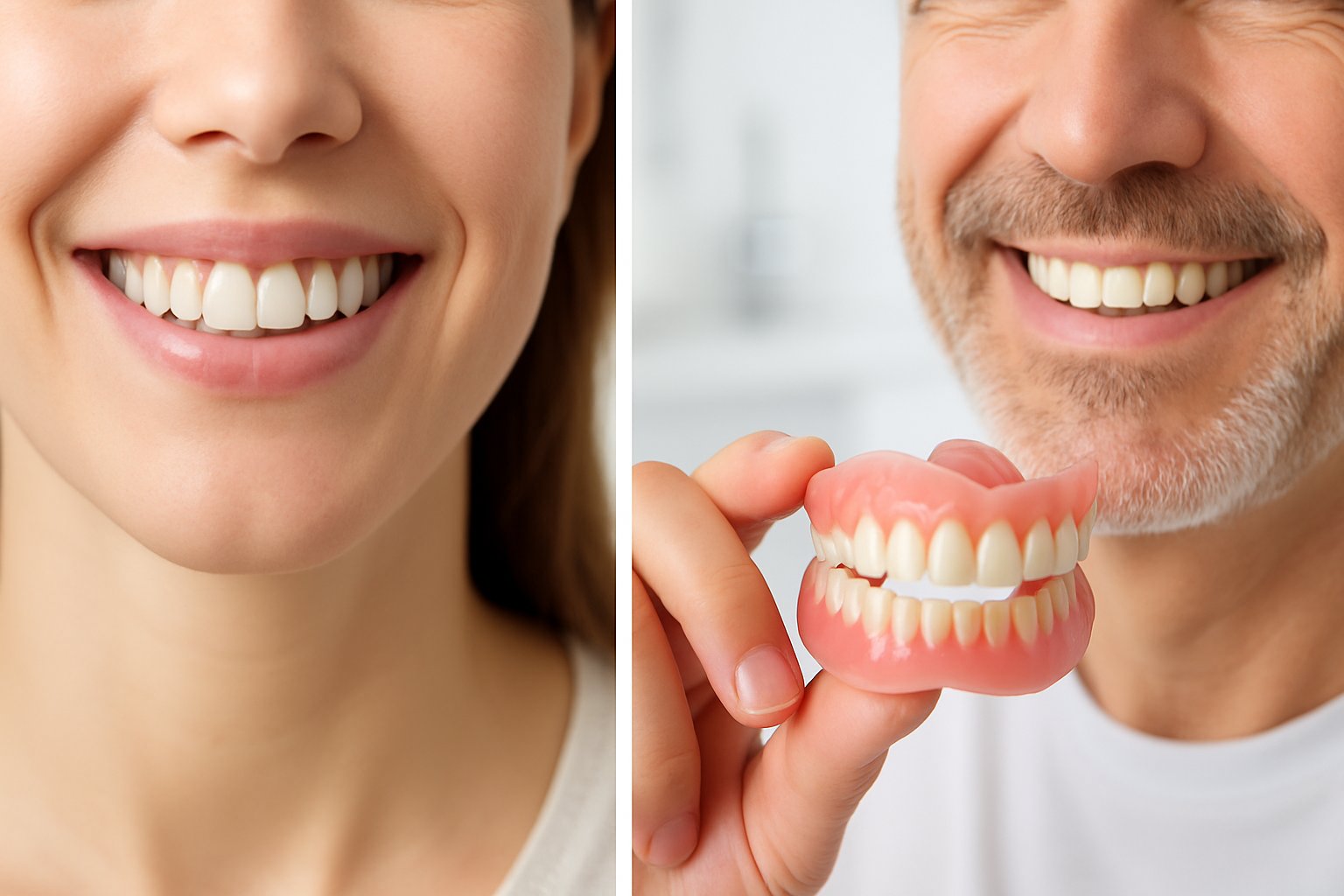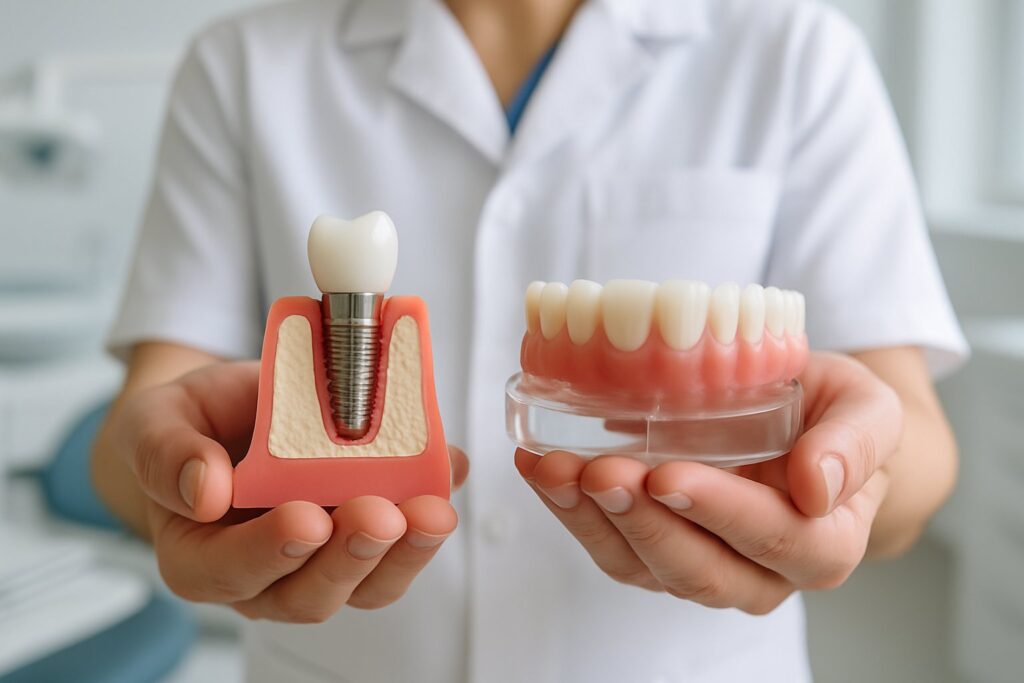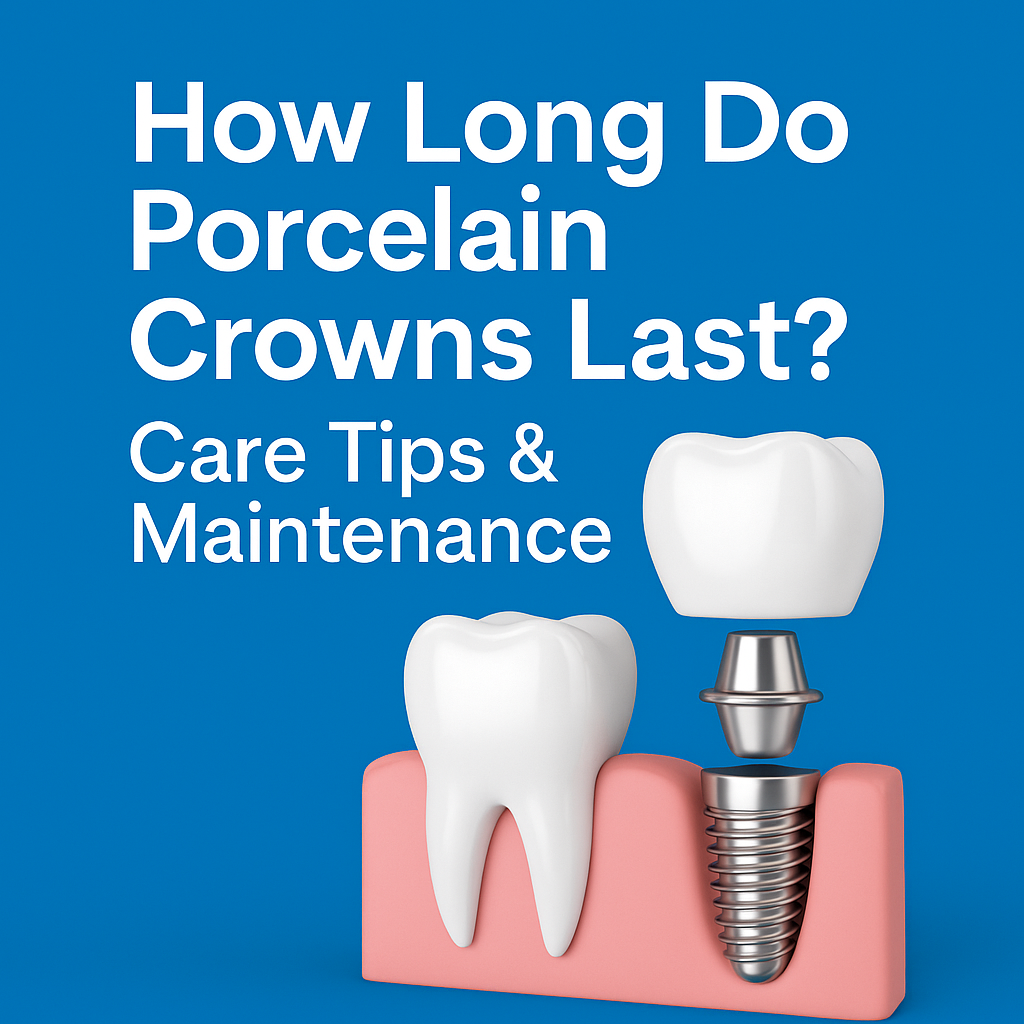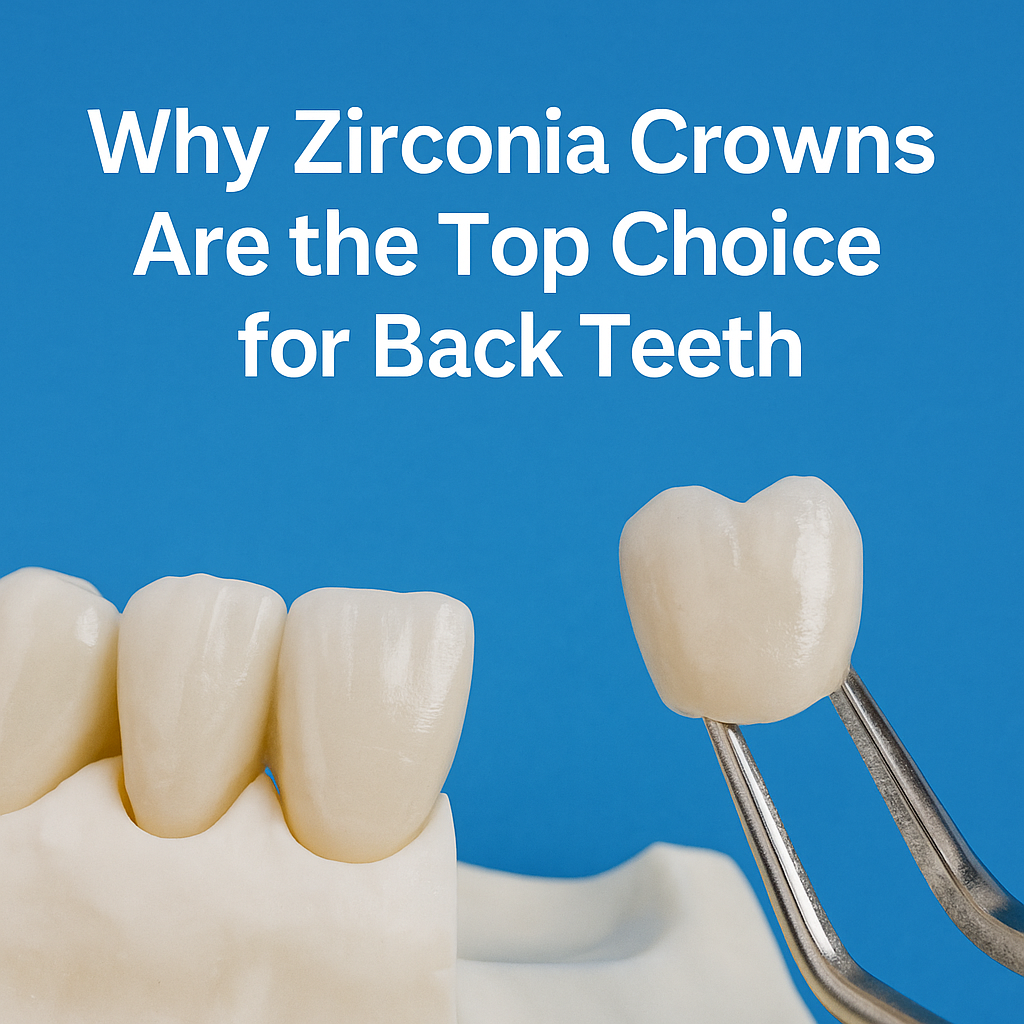Losing teeth can change how we eat, speak, and smile. If we have missing teeth, we often wonder whether dental implants or dentures are the right choice for us. Dental implants are a permanent solution, while dentures are removable and usually less expensive upfront.
Both options help us restore our ability to chew and improve our appearance, but they feel and work differently in our mouths. Picking the right choice depends on our health, budget, and personal needs. Understanding the pros and cons of each helps us make the best decision for our long-term oral health.
Key Takeaways
- Dental implants and dentures are both options for replacing missing teeth.
- Comfort, cost, and durability differ between dental implants and dentures.
- The best choice depends on our needs, oral health, and lifestyle.
Understanding Dental Implants
Dental implants are a common choice for replacing missing teeth. They offer a stable foundation by acting as artificial tooth roots and can support single crowns or multiple teeth with an implant-supported bridge.
How Dental Implants Work
Dental implants are metal posts, usually made of titanium, that are surgically placed into the jawbone. Over time, the bone grows around the post. This process is called osseointegration. This helps hold the implant firmly in place.
Once the implant post has fused with the bone, a connector, called an abutment, is attached. The dental prosthetic, such as a crown or bridge, is then secured to the abutment. This creates a replacement tooth that looks and works much like a natural tooth.
We need to make sure the jawbone is healthy before getting an implant. Sometimes, bone grafting is needed if bone loss has occurred. Implants do not move, making chewing and speaking easier. They also help support the surrounding teeth and stop bone loss in the jaw.
Components of Dental Implants
A dental implant has three main parts:
- Implant post: This is the screw-shaped, metal piece that acts as an artificial tooth root.
- Abutment: This small connector links the implant post with the artificial tooth.
- Dental prosthetic: This is the visible part, such as a crown, bridge, or denture.
Table: Parts of a Dental Implant
| Part | Function |
|---|---|
| Implant Post | Replaces the tooth root & supports implant |
| Abutment | Connects post and prosthetic |
| Prosthetic | Artificial tooth for chewing and speaking |
Implant-supported bridges use multiple implant posts to hold two or more teeth in a row. These are often used if several teeth are missing in the same area.
Suitability for Dental Implants
Not everyone is a good candidate for dental implants. Healthy gums and a strong jawbone are needed to hold the posts in place. We may not recommend implants if there are certain health problems, such as uncontrolled diabetes or gum disease.
People who smoke may have a higher chance of implant failure. Good oral health habits are important. Regular brushing, flossing, and dental visits help keep implants healthy.
Age is not a major barrier, but young people with growing jaws may need to wait. Our dentist checks bone density and overall health before suggesting implants as a solution for missing teeth.
Understanding Dentures
Dentures are removable devices that replace missing teeth. They help us chew food and speak clearly when we have lost our natural teeth due to injury, decay, or age.
Types of Dentures
There are several kinds of dentures used today. Traditional dentures replace a full set of teeth in the upper or lower jaw. These are made to fit directly over our gums.
Partial dentures are different because they only replace some teeth. They attach to our remaining natural teeth, bridging gaps from missing ones. Modern dentures sometimes use metal and acrylic for better fit and comfort than older models made mostly from plastic.
We can choose between complete and partial dentures depending on how many teeth we need to replace. Dentures may also be fixed or removable, but most are easy to take out and clean.
How Dentures Are Made
Dentures are custom-made for each of us. Dentists start by taking molds of our mouth to get the right size and shape. They use these molds to design a wax model, which we try on to make sure it fits and looks right.
After we approve the model, dental technicians use acrylic resin, plastic, or sometimes a mix of metal and acrylic to create strong, comfortable dentures. The artificial teeth are carefully matched to our natural tooth color.
It usually takes a few weeks from start to finish. During this time, adjustments make sure the dentures sit comfortably and do not cause sore spots.
Who Is a Candidate for Dentures
Most adults who have lost several or all of their teeth are candidates for dentures. This includes those who have lost teeth from gum disease, tooth decay, or injury.
We need healthy gum tissue and enough bone in our jaw to support the dentures. In some cases, if bone loss is too great, the dentist may recommend other options or preparatory treatments.
People who have trouble with chewing or speaking because of missing teeth often benefit from dentures. Good oral hygiene and regular dental visits help us keep our dentures in the best condition.
Comparing Tooth Replacement Options
We have several ways to replace missing teeth, like dental implants, dentures, and bridges. Each option has its own benefits, drawbacks, and costs, which can affect our daily lives and long-term health.
Dental Implants vs. Dentures: Key Differences
Dental implants are small metal posts that go into the jawbone. They act like the roots of real teeth. We can use them to hold an artificial tooth in place. Implants help keep our jawbone healthy and stop bone loss.
Dentures are removable and fit over our gums. They rest on top of the gums instead of anchoring in the bone. Dentures are less expensive than implants. However, they can slip out of place and must be removed for cleaning.
| Feature | Dental Implants | Dentures |
|---|---|---|
| Stability | Very stable | Can move around |
| Jawbone Health | Helps prevent bone loss | Does not stop bone loss |
| Cleaning | Brush like real teeth | Take out and clean daily |
| Lifespan | Often lasts many years | May need to replace sooner |
| Cost | Higher initial cost | Lower cost upfront |
Deciding between implants and dentures can depend on bone strength, budget, and personal preference.
Implant-Supported Bridge vs. Traditional Methods
An implant-supported bridge replaces several missing teeth in a row. It uses dental implants as anchors, instead of grinding down healthy teeth. This gives us strong, fixed artificial teeth that do not rely on nearby teeth for support.
A traditional bridge uses our healthy teeth next to the gap as anchors. The dentist has to remove enamel from these teeth to fit the bridge. This can weaken them over time.
Key Points:
- Implant-supported bridges help protect healthy teeth and jawbone structure.
- Traditional bridges may be quicker but can affect nearby teeth.
- Both bridges and dentures can fill gaps, but implants usually last longer and feel more like natural teeth.
When choosing a tooth replacement option, we should think about comfort, cost, and how each method might impact the rest of our mouth.
Comfort and Patient Experience
When comparing dental implants and dentures, we need to pay close attention to fit, stability, how natural they look and feel, and what patients report about comfort. The type of dental restoration we choose can affect daily activities like eating, talking, and smiling.
Fit and Stability
Dental implants are anchored directly into the jawbone, which helps them stay in place. This secure fit allows us to eat foods like apples or steak without worrying about movement. Implants do not slip or shift because they function like our natural tooth roots.
Dentures, especially those not custom-fitted, can sometimes shift or cause sore spots. Suction and adhesives may help, but movement while talking or eating is common. This affects our confidence and ability to enjoy various foods.
A comparison:
| Feature | Dental Implants | Dentures |
|---|---|---|
| Anchored in jawbone | Yes | No |
| Movement during chewing | Rare | Sometimes frequent |
| Need for adhesives | No | Often |
Natural Appearance and Feel
Implants often use porcelain crowns, which look very close to natural teeth. Gum tissue fits around the implant naturally, and we usually cannot spot the difference. They let us smile and speak with more confidence.
Dentures are designed to look like teeth, but the shape and color may not always match our real teeth or gums. The material can also feel different in the mouth, and the feel changes with temperature or moisture.
Implants allow us to bite and chew almost like we do with real teeth, while dentures may reduce bite force and alter taste slightly.
Patient Comfort
Many patients with implants say they forget they even have them after healing. There are no removable parts, and cleaning is similar to natural teeth. Soreness and gum irritation are rare with implants.
With dentures, some discomfort is common, especially soon after getting them. Pressure spots, sore gums, or gagging can happen. Cleaning and removing dentures every night is needed, which some find inconvenient.
Implants let us enjoy a more normal eating and speaking experience. Dentures sometimes limit what we eat and need more care to prevent problems like mouth ulcers or infections.
Impact on Oral Health
Dental implants and dentures each affect our mouths in different ways. The main differences involve how each option interacts with our jawbone and what we need to do to keep our mouths clean.
Effect on Jawbone and Facial Structure
Implants are placed directly into the jawbone. This helps keep the bone strong and healthy because the implant acts much like a natural tooth root. When we chew with an implant, it sends signals to the bone to keep its structure and shape.
Dentures, by contrast, rest on the gums without connecting to the jawbone. Over time, this can lead to bone loss and cause the jaw to shrink. The loss of bone may change our facial structure and make our faces look older or sunken. Some people may need bone grafting if they want implants after wearing dentures for a long time because of this bone loss.
Oral Hygiene Requirements
To keep dental implants healthy, we need to brush and floss them just like real teeth. Good oral hygiene helps prevent problems like gum disease, which can cause implants to fail. We should visit the dentist for checkups and clean around the implants carefully.
Dentures need to be removed and cleaned daily. We should brush them with a denture cleaner and brush our gums, tongue, and roof of the mouth too. If we do not clean dentures properly, bacteria can build up, which may cause infections or sore spots. Both options require us to follow a routine for the best oral health.
Longevity and Durability
Dental implants and dentures both replace missing teeth, but their lifespan and the care they need are very different. Knowing how long each option lasts and how to take care of them can help us choose which solution works best for us.
Expected Lifespan
Dental implants are designed to be a long-lasting solution. With proper care, implants can last 15 years or longer, and often more than 25 years. The implant post, made from titanium or zirconia, is strong and resists decay much like our natural teeth roots. The crown on top of the implant may need to be replaced after 10–15 years, but the implant itself rarely fails if we keep it clean and follow our dentist’s advice.
Dentures usually last 5 to 10 years before we need to replace or adjust them. Over time, our gums and jawbone can change shape, which makes dentures fit loosely. This means we may need new dentures or adjustments more often than with implants. Dentures are more prone to cracking, breaking, or wearing down.
| Tooth Replacement | Expected Lifespan |
|---|---|
| Dental Implants | 15–25+ years |
| Dentures | 5–10 years |
Maintenance and Care
Dental implants need care similar to natural teeth. We must brush twice a day, floss daily, and visit our dentist regularly. Proper oral hygiene helps prevent gum disease and keeps the implants healthy. Implants do not get cavities, but the nearby gums can still develop infections if we skip cleaning.
Dentures need a different type of maintenance. We must take them out each day and clean them with a denture brush and cleaner, not regular toothpaste. Dentures should soak overnight in a special solution. We also need to clean our gums and tongue daily. Denture wearers may need to use adhesives to keep them in place. Dentures can stain, warp, or break if we don’t care for them properly.
| Care Step | Dental Implants | Dentures |
|---|---|---|
| Brushing | Yes, like natural teeth | Yes, but outside the mouth |
| Flossing | Yes | Not needed |
| Daily Soaking | No | Yes, with solution |
| Professional Checks | Twice a year | Once or twice a year |
Procedure and Recovery
Dental implants and dentures both help restore missing teeth. These options involve different steps, healing processes, and levels of invasiveness that can affect how we choose the right treatment.
Invasive Surgery and Treatment Stages
When we look at dental implants, they require more invasive surgery. First, we attend a consultation where the dentist checks our bone and mouth health. Next, small titanium posts are placed into the jawbone during a surgical procedure.
After the implant post is put in, we need a period of healing. Later, a small connector, called an abutment, and the final crown are added. The process may require several dental visits and sometimes bone grafts if our jaw isn’t strong enough.
In contrast, dentures do not usually need surgery. We may need to have any unsalvageable teeth removed before fitting. After healing from tooth extractions, impressions of our gums and mouth help make custom dentures. Fitting and adjustments happen over a few visits, but there is no need to place anything into our jawbone.
Healing and Recovery Time
Dental implants have a longer recovery period. The surgical site takes several months to heal, often between 3 to 6 months, as our jawbone fuses to the implant post. During this stage, we may need temporary teeth.
We might experience swelling or mild discomfort for a few days after surgery. Proper care, like good hygiene and follow-up visits, is crucial for early recovery and long-term implant success.
Dentures have a quicker recovery time. After any tooth extraction, we may need a few weeks for our gums to heal before receiving dentures. There is usually some mild soreness or adjustment period as we get used to wearing dentures, but this improves with time and minor adjustments. We can usually eat and speak more easily soon after fitting, without a long healing stage.
Cost Considerations
Dental implants and dentures come with very different costs. We need to understand what we pay for up front, what ongoing expenses look like, and how insurance and budgeting might affect our decision.
Initial Costs
Dental implants usually have higher upfront costs than dentures. One implant can cost between $3,000 and $5,000, including the surgery, abutment, and crown. If we need several implants, the price rises quickly.
In comparison, dentures have a lower starting price. A complete set of traditional dentures might cost between $1,000 and $3,000. Partial dentures are often less expensive, sometimes under $1,000. The process for dentures usually takes less time, which can mean fewer office visits.
Here’s a quick table for comparison:
| Option | Price Range Per Arch |
|---|---|
| Implants | $3,000 – $5,000+ |
| Dentures | $1,000 – $3,000 |
Other factors like extractions and bone grafts can add to the final total. Implants especially may require these extra procedures, which increases the initial cost further.
Long-Term Value
While implants cost more at first, they tend to last much longer than dentures. Dental implants are made from strong materials like titanium and can last for decades with good care. We may only need small adjustments or a replacement crown after many years.
Dentures typically need to be replaced or relined every 5 to 7 years. Over time, this means we might pay several times for new sets or adjustments. denture adhesives, cleaning supplies, and possible repairs add more to the total cost over the years.
With implants, we avoid some recurring expenses that are common with dentures. The stability and function of implants can also reduce unexpected dental bills from discomfort or sore spots.
Budget and Insurance
Our budget strongly affects what option makes sense. While implants cost more, some dental offices offer payment plans. This can allow us to spread out the cost over time and make implants more manageable.
Insurance coverage for tooth replacement varies widely. Many plans cover basic dentures, but they may limit implant coverage, leaving most charges up to us. Some insurance might cover the crown or part of the implant process, but we often pay a large part out of pocket.
It helps to ask our dentist for a written estimate and check with our insurance provider before making choices. Exploring payment plans, health savings accounts, or financing could help make either option fit our budget.
Frequently Asked Questions
We often get questions about the cost, advantages, and differences between dental implants and dentures. Each choice has reasons why it may fit better depending on health, age, lifestyle, and budget.
What are the cost comparisons between dentures and dental implants?
Dentures usually cost less upfront than dental implants. Dental implants have higher initial costs because of surgery and materials.
However, implants may last longer than dentures and need fewer repairs. Over time, this may balance out the cost difference.
What are the pros and cons of choosing dentures over implants?
Dentures are less expensive and do not require surgery. We can usually get dentures made quickly.
On the downside, dentures may slip or feel less natural when we talk or eat. Implants are fixed in place, but they need surgery and more time for healing.
Which option is more suitable for elderly patients, dentures or implants?
Elderly patients often choose dentures because they are easier to get and do not need surgery. But if our health is good and we want something long-lasting, implants may still be an option.
A dentist can help check if our gums and jawbone are healthy enough for implants.
How do snap-in dentures compare to traditional implants?
Snap-in dentures attach to implants but can be removed for cleaning. They feel more secure than regular dentures.
Traditional dental implants are permanent and do not come out. Snap-in dentures are a choice for people who want more stability but still need some flexibility.
What are hybrid dentures, and how do they differ from standard implants?
Hybrid dentures are fixed to several dental implants and do not come out like regular dentures. They offer a more stable feel than standard dentures.
Standard implants support one tooth at a time or just a few teeth. Hybrid dentures replace a whole row of teeth using fewer implants.
Can you explain the differences between implants, dentures, and bridges?
Dental implants use a post in the jaw to hold a replacement tooth. Dentures are removable and replace several or all of our teeth.
Bridges fill a gap by attaching fake teeth to the natural teeth beside the space. Each has its pros and cons, and our dentist will help us choose the best fit for our needs.







